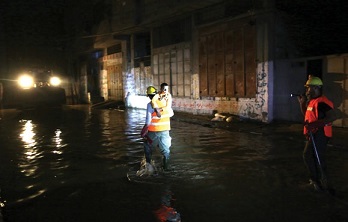Gaza drowning …and under power and media blackout
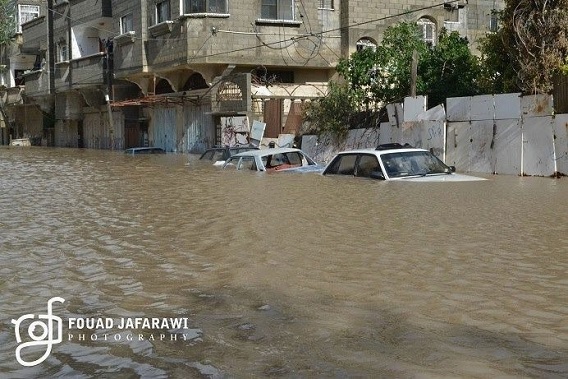
Photos and updates from Gaza paint one of the most dire scenarios the Palestinians locked in the Strip have faced, Israeli bombing campaigns aside.
For over a month Palestinians in Gaza have endured 18 or more hours/day power outages. Now, with unusually heavy rains, cold temperatures, Israeli-released torrents of water (suddenly opening of dams along the border with Gaza), and even snow, Gaza is under water, under siege, and people are suffering freezing conditions. According on one international in Gaza, a baby has frozen to death in one of Gaza’s refugee camps.
Omar Ghraieb, from Gaza, writes:
“44 days without electricity! New emergency schedule started yesterday, electricity hours r downsized to 3 instead of 6, per day! Leaving Palestinians in Gaza with a 21+ hours of power outage a day. Add to this the horrible weather, constant rain, floods, wind, thunder & lightening!”
Israel ‘opens dams’ flooding Gaza Strip near Deir al Balah
Maan News, Dec 13, 2013
“The Gaza Government’s Disaster Response Committee announced late Friday that Israeli authorities had opened up dams just east of the Gaza Strip, flooding numerous residential areas in nearby villages within the coastal territory.
The Gaza Strip is currently under a state of emergency due to severe weather conditions caused by a historic storm front moving south across the Levant.
Fuel shortages have caused daily life in the Gaza Strip to grind slowly to a halt since early November, as power plants and water pumps are forced to shut down, cutting off access to basic necessities for Gaza residents.
Lack of diesel fuel is a result of the tightening of a seven-year-long blockade imposed on the territory by Israel with Egyptian support.”
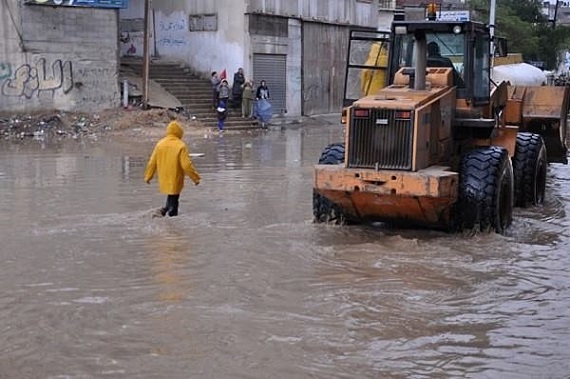
This Is Gaza: “Despite of their slim and few equipments , Civil defense members are still working dramatically in order to secure citizens’ homes and save the stricken homes from cold weather in Rafah and Khan Yonis in the Gaza strip. There is no doubt that siege impacts on their work dramatically where they face mobility problems with their vehicles due to lack of fuel , and power outages for long hours. However, they confirm that they will continue their work although the lack of resources , and the difficulty of circumstances.”
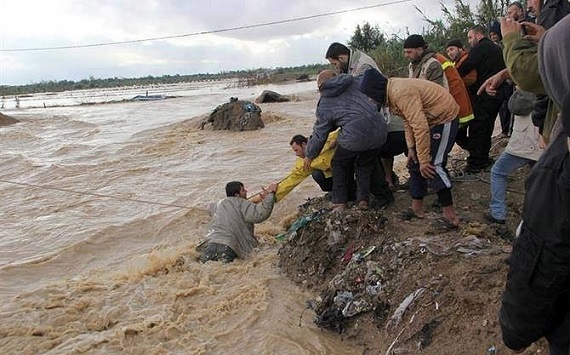
This Is Gaza: “Many Gaza houses were totally submerged with the heavy rains! Hundreds of people became homeless and were evacuated to temporary shelters in local schools. Gaza needs your help URGENTLY!”
Widespread flooding in Gaza forces thousands to flee homes
Maan News, Dec 13, 2013
“The Gaza Strip was pounded by fierce winds and rain again on Friday as flooding reached dangerous levels in many areas, forcing thousands to flee their homes amid widespread power outages as temperatures plunged into the single digits.
The flooding was worst in the northern Gaza Strip, where hundreds fled their homes and water levels reached 40-50 cm in some parts, forcing residents to use boats to navigate their neighborhoods.
The Gaza government said in a statement on Friday that so far 2,825 people have been evacuated from their homes, reaching a total of 458 families.
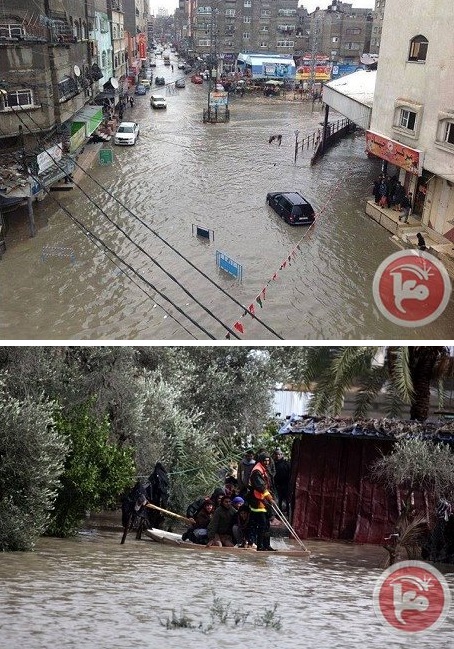
UNRWA spokesperson Chris Gunness:
“After so many years of the Israeli blockade, the public health system in Gaza was already acutely and chronically damaged, so the man-made problems inflicted on Gaza are compounded by the extreme weather conditions.”
[Ezz al Zanoon, a photographer based in central Gaza] stressed that the storm had compounded the already dangerous conditions Gaza residents were living under as a result of severe fuel shortages over the last few months.
“Electricity is only on for one or two hours a day,” he said, pointing out that in the days before the storm’s arrival daily electricity availability had dropped drastically from previous levels of six to 12 hours.
“People are suffering as they wait up all night for the electricity and water to come on,” he added, pointing out that water availability was dependent on the availability of electricity with which to pump it.
“There is no movement, no one goes out. Even those who work can’t go out. The people hold Hamas and Fatah responsibly, both Haniyeh and Abbas. How could they let the situation of the children in this country become like this? We know there is a siege (on Gaza), but there has to be a solution. Abbas is the most responsible, why doesn’t he do anything?”
The Gaza Strip has been without a functioning power plant since the beginning of the month, when the plant ran out of diesel fuel as a result of the tightening of a seven-year-long blockade imposed on the territory by Israel with Egyptian support.
The plant itself was only reopened last year after it was targeted by an Israeli airstrike in the 2006 assault on the Strip. The power plant generates around 30 percent of the Gaza Strip’s electricity supply, while the rest comes from Israel and Egypt.
Until July of this year, the tunnels to Egypt provided a vital lifeline for the territory amidst the otherwise crippling Israeli blockade. The blockade has been in place since 2006, and it has limited imports and exports and led to a major economic decline and wide-reaching humanitarian crisis.
In the last year, however, the situation had greatly improved, as the tunnels to Egypt witnessed a brisk trade following the Egyptian Revolution.
Gaza Strip energy officials have blamed Egypt for destroying numerous tunnels linking the Gaza Strip and Egypt in recent months. They also blamed the Fatah-led Palestinian Authority for charging taxes on fuel too high for Gaza Strip authorities to afford.”
State of Emergency in Gaza
Mohammed Omer/Washington Report on Middle East Affairs/Another World Is Posssible
We decided to make this urgent report from Mohammed Omer into an action alert—Gazans need our help now!
Contact Secretary of State John Kerry
U.S. Department of State
2201 C ST., NW
Washington, DC 20520
Call: 202-647-4000; select option 4 and ask operator for the comment line.
202-647-6575 (Public Communication Division); select option 8 to leave your comment.
It is cold, there is no power, and I am charging my computer using a car battery in order to get this message out. It is so cold in Gaza that everyone has cold feet and a cold nose. A new storm is hitting this besieged enclave. There is no electricity, and shortages of water, fuel, and vital services mean people just sit and wait for the unknown.
Tens of houses east of Gaza City, in the northern Gaza Strip, in Khan Younes and Rafah are flooded with rain today. The sewage system cannot function and Gaza municipalities announced a state of emergency. Schools and most shops are shut, there is no traffic and few people are walking in the street.
Gaza City’s garbage trucks have been at a standstill due to the ongoing fuel shortage. I’d gotten used to the bright orange truck that usually passes by, sounding its horn, a sign for all my neighbors to bring out their garbage for collection.
Now the donkey is our only remaining hope. Since last week—when fuel supplies ran dry—the only sound one hears now is the click-click of their hooves as they pull their carts along the road at 4 a.m. By noon, they have collected all they can on their busy route. In Gaza’s Barcelona neighborhood, garbage containers are overflowing—a normal occurrence since fuel ran out.
I went down to chat with 41-year-old Abu Ghaleb. Alone, on his donkey-cart, there’s no way Abu Ghaleb can manage to clear all the streets of garbage. A shy, slim man, his attention is focused only on collecting sacks of garbage, which he piles onto the donkey cart, empties, then moves on to the next pile.
Prior to the crisis, Abu Ghaleb sold palm dates from his donkey cart, calling customers through a loudspeaker. It’s a business which doesn’t pay well—especially when people have their wages delayed and cannot buy his dates, which begin to spoil on the cart.
Now Abu Ghaleb’s only option is to collect garbage, which earns him around $200 per month—not much to feed his family as well as his donkey. But at least he keeps a sense of humor about the situation. He tells me, smiling shyly, “The fuel crisis means that people like me get some work at least.”
Because the Gaza municipality can’t afford to purchase expensive Israeli oil, it pays 450 people, who work with 250 donkeys, to clear away massive piles of garbage before health risks worsen among the 1.8 million Gazan civilians under siege by Israel.
After collecting piles of garbage and filling his cart to the brim Abu Ghaleb is tired and excuses himself. I am well aware that I may not see him for many days, because he is in such high demand. So my only option is to find a place to dump the garbage from my apartment. The smell is becoming unbearable.
On 8th Street in Gaza City I run into a mother and her small daughter on a donkey cart. I wonder if she is doing work similar to Abu Ghaleb’s and taking her daughter with her. But I soon learn that she earns a living, and supports eight children, by recycling household waste. She can use plastic to cover a broken window or an old frame to make improvised items of furniture.
We had no running water for the past two days—when there is no fuel, water is not pumped regularly into houses. The tank on our rooftop is empty. So we can’t even flush our toilet.
Fuel cannot enter Gaza through the supply tunnels recently shut down by Egypt’s new government. As a result Gaza’s water-treatment plant is at standstill, with raw sewage waist-deep in some streets and flooding into Gazan homes, bringing with it rats and disease.
The political strife between Hamas and opponents—Israel and the Palestinian Authority on one hand, and the Egyptian regime on the other—is affecting the life of everyone here.
According to the United Nations, Turkey donated $850,000 dollars to ease the crisis. But from what I hear from the local municipality, this represents just a small drop in a very large bucket. The 16,700 liters of fuel which was received in Gaza City will last for only a few days. Officials say the Gaza Strip needs 150,000 liters per month for garbage trucks alone.
Tonight, the smell of rotten sewage floods into my nose. I inhale and exhale the stink of rotten garbage. The night air is filled with this suffocating smell, and in the morning I can only hope that Abu Ghaleb will be around with his donkey and cart to try to clear away as much as he can.
It makes me wonder if U.S. Secretary of State John Kerry is aware of Gaza’s situation. Would he find it acceptable if Israeli citizens lived in the same conditions as Gazans? Or don’t we in Gaza count as humans?
I wander down the street to see what others are doing. Abu Karim sits in his supermarket, door closed, unable to tolerate the odor. One of his neighbors tried to lessen the smell by burning his garbage—so now the night air is filled with smoke as well as the nauseating smell of burned plastic. The basic act of breathing is uncomfortable, and I am aware that however I try to describe this mess to Washington Report readers, I cannot do justice to the present crises.
My friend Richard Falk, the U.N. special rapporteur, described the situation in Gaza as a near catastrophe. I can only hope it stays at the “near” level—which is crisis enough—without getting any worse.
As floodwaters continue to invade people’s homes, Abu Ghaleb—and even his donkey—understand the dire situation facing the people of Gaza. It’s one that political leaders can’t—or don’t want to—grasp.
Freezing and canoeing in Gaza
Fidaa Abuassi on December 13, 2013
“I haven’t heard from my family for 3 days, haven’t seen any of my siblings online anywhere, so I called (internationally since I could neither Skype or Viber). My mom said “habibti we are doing well Alhamdulliah. Don’t worry. We just didn’t have power for three days in a row, no internet, no water, nothing. It’s extremely cold and we are freezing. But we are better than others whose houses are drowning.” She then handed the phone to my dad. His voice sounded so desperate! He was repetitively saying “what could we do, dear!” Never “seen” him this depressed before!
Gaza is drowning today. You will see people kayaking and canoeing not the type of fun activities the world knows. Houses are flooded by water. People are freezing there. No power. No water. No heat. No fuel. This is a catastrophe. A CATASTROPHE. I need to do something to help. I felt so helpless that I wanted to call 911, Red Cross or Amnesty International. Anyone! I want to tell the world that Gaza is living an unspeakable disaster and in a bad need for your help. I cannot be silent. You cannot be silent.”
Northern Gaza:
Published on Dec 12, 2013, the IMEU:
“Unlike Manhattanites, though — or, more to the point, unlike their neighbors in Sderot — Gaza’s refugees have nowhere to flee when heavy rains, as in this video, flood their 25-mile occupied territory, blockaded by land, air, and sea.”
Photos of Gaza submerged: Muath Humaid-Gaza
___________________________________________________________________________________
Article published here: In Gaza. Via: Gilad Atzmon. More here: CounterCurrents
URL: http://www.a-w-i-p.com/index.php/2013/12/17/gaza-drowning-and-under-power

























